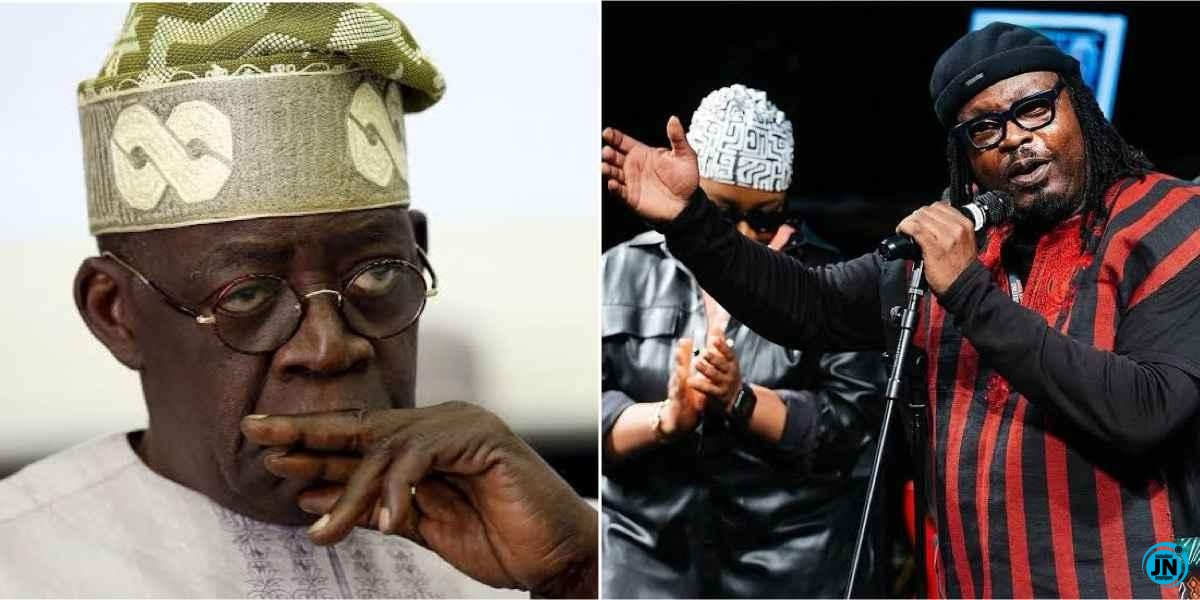
Veteran Nigerian rapper Eedris Abdulkareem [/b]has recorded a significant victory amid controversy, as his recently released protest song, *Tell Your Papa*, continues to gain substantial attention despite facing a broadcast ban imposed by the National Broadcasting Commission (NBC).
The track, which openly critiques President Bola Tinubu’s administration, was banned from airplay by the NBC on April 10, 2025, citing alleged violations of the Nigerian broadcasting code. The decision to ban the song has sparked a great deal of controversy, but paradoxically, it seems to have fueled a surge of interest in the track, which has now gone viral across various streaming platforms.
As of the latest reports, *Tell Your Papa* has racked up over 89,000 views and 2,800 likes on YouTube—an impressive increase from its initial 22,754 views and 1,200 likes shortly after its release. The song has also accumulated more than 30,000 streams on Spotify, further underscoring the rising public interest in the song following the broadcast ban.
In response to the ban, Eedris Abdulkareem drew a parallel between the current censorship of his song and the previous suppression of his 2004 protest anthem *Jaga Jaga*. Abdulkareem accused the present government of stifling dissent and curtailing constructive criticism, sentiments that he expressed strongly on social media platforms. In an Instagram post, he remarked:
“It’s obvious that in Nigeria, truth and constructive criticism is always deemed a big crime by the government.”
The Performing Musicians Association of Nigeria (PMAN) also weighed in on the matter, stating that the NBC’s decision to ban the song would likely backfire by drawing more attention to it, inadvertently boosting its popularity among the Nigerian public. The organization expressed concern over the broader implications of the ban for artistic freedom and the right to express dissent in Nigeria.
Adding to the growing backlash against the NBC’s actions, renowned Nigerian playwright and Nobel laureate, Professor Wole Soyinka, publicly criticized the censorship decision. In a statement issued from New York University in Abu Dhabi on Sunday, April 13, Soyinka condemned the ban as a dangerous return to censorship and a direct assault on freedom of expression in Nigeria. Soyinka also emphasized that the act of banning the song was counterproductive, as it had only served to amplify its reach and popularity. He remarked ironically that the ban didn’t go far enough, suggesting that Abdulkareem himself and his supporting music associations should be targeted for further repression.
Soyinka warned that censorship of this nature could prove damaging to democracy, arguing that a government intolerant of criticism was setting itself on a dangerous path. He urged regulatory authorities to reconsider the ban and reverse what he called “petulant irrationality,” warning that a government that suppresses free speech is on a slippery slope to self-destruction.
Interestingly, Professor Soyinka admitted that he had not actually listened to the banned song himself but pointed out that the central issue at hand was not the lyrics of the song but rather the principle of freedom of expression. He added that the ban had inadvertently benefited Abdulkareem, as it served as free promotion for the track, dramatically increasing its exposure. Soyinka remarked that the rapper was likely profiting from the publicity, saying, “The ban is a boost to the artist’s nest egg, thanks to free governmental promotion. Mr. Abdulkareem must be currently warbling his merry way all the way to the bank. I envy him.”
In response to the censorship, many Nigerians have taken to social media to express their support for Abdulkareem and their frustration with the ban. One YouTube user, Sheggzyunited, commented, “Naija government, this is 2025, for goodness’ sake. There is no single lie in the song.” Another fan, Asa Anthony, added, “They were too quick to ban it because the message was well passed. We mount on streaming platforms and social media.” On Instagram, @directorjoelmatt echoed similar sentiments, writing, “Our government doesn’t like the truth.”
The viral attention surrounding *Tell Your Papa* continues to grow as Nigerians voice their outrage over the censorship, with the track gaining more traction on streaming services and sparking debates on freedom of expression in the country. It remains to be seen how the controversy will unfold in the coming days as more people continue to listen to the track and engage with the message it conveys.
See below;

